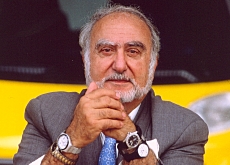“Made in Switzerland” wants entrepreneurs

Switzerland needs entrepreneurs who come up with ideas and who manufacture products inside the country, if its economy is to continue to prosper.
This was the message of a one-day conference in the capital Bern, devoted to Swiss manufacturing of the future, or simply put “made in Switzerland”.
While industrial activity in Switzerland is flourishing at present, particularly in engineering – the leading export sector – there can be no room for complacency, experts said.
Figures show that in 1990, 37 per cent of the working population was active in industry. That figure is now down to 26 per cent, partly because of automation.
Both the European Union and Switzerland argue that a sustainable and balanced economy is only possible if it includes a strong manufacturing component.
Increasing services
The “Swiss Manufacturing of the Future” initiative is part of Europe-wide efforts to promote industry and not rely on the growing services sector.
“This initiative is important in so far as Switzerland will in the future remain an important place where we have industrial activities,” Swiss Economics Minister Joseph Deiss told swissinfo.
“It aims at developing entrepreneurship in this country, and I welcome this of course.”
For one of Switzerland’s most outspoken captains of industry, Swatch Group chairman Nicolas G. Hayek, there is no doubt that manufacturing has been losing importance in Switzerland.
Hayek is a member of the so-called ManuFuture High Level Group set up by the European Commission to assure the future of manufacturing in Europe.
Losing ground
“It’s losing ground and it shouldn’t because it was one of the most important factors of Swiss wealth and growth,” he told swissinfo.
“To correct this we need first of all real entrepreneurs, not managers but real entrepreneurs, creative people who make new products and create jobs.”
“That’s why we have created this forum to sensitise the whole population, and the young generation to consider the job of being an entrepreneur and not something else,” he added.
Being an entrepreneur did not mean being the richest and most powerful captains of industry in a country. It could include gardeners, bakers or carpenters, he said.
Hayek said an entrepreneur for him was someone with much imagination, who was looking for innovation and had plenty of courage to overcome the challenges of daily life.
“Picasso is a good example for me of a big entrepreneur. He created new things, he created new jobs, he created new wealth and he communicated it to the people.”
More pleasure
“I would tell people to consider being an entrepreneur because it gives you much more pleasure in life and you can develop and help society much more than if you were [doing] something else,” he argued.
Hayek has on more than one occasion cited the “something else” as a bank employee who “sits in a dark room in front of a computer and plays on the stock exchange, hoping that he might make some money from it”.
He told swissinfo that although the situation of industrial manufacturing in Switzerland was not “terrible”, it had to be corrected now before Switzerland ceased to have industrial production in 30-40 years’ time.
But why produce in Switzerland where costs are high and even domestic companies have been looking abroad to reduce labour costs?
Economics Minister Deiss, not surprisingly, wants the best of both worlds.
Both worlds
“It’s important for me to have a lot of enterprises which choose the location of Switzerland to develop their activities. This is my first duty to create and maintain jobs in this country.
“On the other hand, it is important for our enterprises to get access to foreign markets. Today this is very frequently possible only if you are on the spot. I’m not afraid about Swiss enterprises that partially locate their activities in foreign countries because these can be an important impetus for their home activities,” he said.
But he told swissinfo it was not the job of the federal authorities to become too involved in the world of Swiss companies.
“I would say the duty of the state is not to be active in the economy. We have to give them [the companies] the largest possible freedom of manoeuvre but we have to create the best possible framework conditions, whether regarding taxation, competition or the opening of new markets.”
swissinfo, Robert Brookes
In Switzerland there are more than 317,800 companies with 3.7 million employees.
About 307,000 companies with fewer than 250 employees account for 96.6% of the total.
The industrial sector has 76,000 companies with one million employees, less than a third of all companies and employees.
The European Commission launched the ManuFuture Initiative in 2003. It aims to promote the future of manufacturing in Europe through research and innovation.
It argues that manufacturing is critical to wealth generation and job creation.
The chairman of Switzerland’s Swatch Group, Nicolas G. Hayek, is a member of ManuFuture’s High Level Group.

In compliance with the JTI standards
More: SWI swissinfo.ch certified by the Journalism Trust Initiative











You can find an overview of ongoing debates with our journalists here . Please join us!
If you want to start a conversation about a topic raised in this article or want to report factual errors, email us at english@swissinfo.ch.